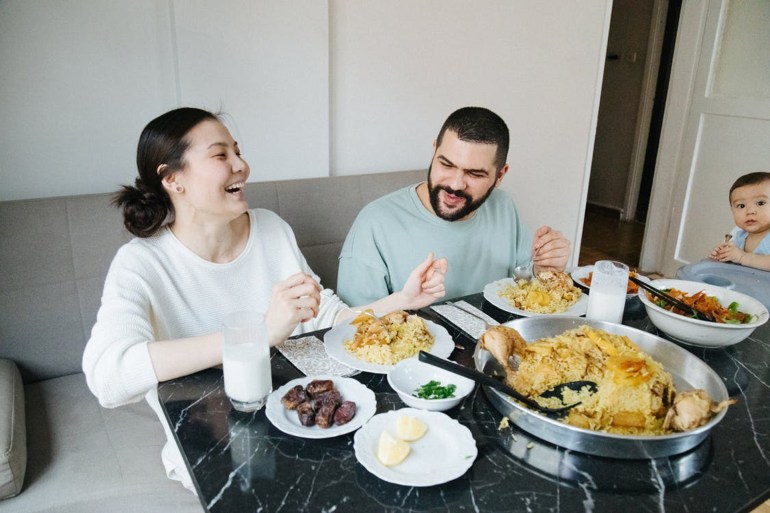If we open the door to memories with fasting during the month of Ramadan, those who are fasting will remember that the journey began since childhood, some of them have stubbornly and insisted on fasting since the age of five, and some of them are taught by their families to fast at the age of ten, but it is common for them to gradually become accustomed.
Half a day, then a day and a day, then breakfast only when tiredness, and so on until fasting became a habit and worship, but what is the condition of those who converted to Islam in old age and suddenly became required to fast?
How was their experience?
Pascala - who became Muslim in 2018 - told Al-Jazeera Net that "my first year of fasting was very difficult, as I was staying in my country the Netherlands, and Morocco was around ten thirty in the evening, while dawn was around four in the morning. This is in addition to that I was working as a stewardess." Flying, and sometimes the trips lasted for hours and we arrived at the hotel after the restaurant closed, so I did not have food for the dawn, but - nevertheless - I was able to fast for the whole month except - perhaps - for 3 days. "
As for Maria - who is a Mexican-American - she says, "I started fasting since I became a Muslim in my first year, and for me it was very easy. I realized that it was good for me and I prayed to God to make it easy."
It is known that fasting hours in some European countries exceed 20, while it may not exceed 16 hours in the United States.
The closer we got to the north of the globe, the longer the day would last, and the more we turned towards its south, the fewer hours of fasting.
Experiencing fasting in old age may be a little more difficult for new Muslims / emoji (pixels)
Fasting experience
"I was in a Catholic school and I had Muslims with me, and we used to ask them the famous question," Not even water? "Pascala continued," so it was difficult for me to imagine fasting an entire month without water. Islam was not on my mind at the time. "
And about the reasons for the transformation in her life, Pascala says, "I got to know my current husband, and we were talking about the future, so I asked him what about our children? And he told me that they would be raised as Muslims. So I decided to read and learn to understand about Islam and decide, because I love to educate myself. So I started reading the Qur’an, and I was surprised by the scientific predictions; Like "Marj Al-Bahrain" and the barrier between them, but I did not think deeply about it until I read the verses. Likewise Surat Al-Hadid affected me a lot. "
As for Maria, she recalls the experience of fasting, saying, "I had no fear of experiencing fasting, but the anxiety was that my family would accept me as a Muslim, and I would tell you the truth when I say, fasting was very easy for me. Islam changed my life, before that I used to eat all the time, I started fasting." Since the beginning of Ramadan, I passed as a Muslim. I could not wear the hijab at the beginning and I gradually put it on, but I started fasting from the first year. "
Maria added to Al-Jazeera Net, "I was divorced (free) when I became Muslim, and after several months of my conversion to Islam, my daughters also accepted Islam. Then I met a good man from Oman and we got married in 2019, and she continued," My daughters are now 13 and 15 years old and they fast with us the whole month, as well. I have an 8-year-old daughter and a baby. "
Milk and dates are permanent guests at the Iftar and Suhoor tables in Ramadan / Image (Pixels)
Blending cultures into meals
Regarding iftar meals, Pascala says, "Usually we break our fast with 3 dates, water and soup, and we try to stick to healthy eating. And in the suhoor it can be dates and oats."
As for Maria, she is keen to get acquainted with Omani cuisine. "I am gradually learning from my husband a lot about Omani culture, as well as a lot about Ramadan," she says.
"Usually we eat fruits, yogurt, granola, or rice and legumes, and drink liquid yogurt," Maria added. "At first I avoided a lot of food for fear that it would tire me out while fasting, but my husband told me you can eat what you want. As for breakfast, we break our fast with dates, water, melon, or whatever." Fruit, then the main meal which might be rice and lamb. "
As for the Tarawih prayer, for Pascala and Maria they try as much as they can to adhere to it, but the pandemic has made many people pray at home, and that despite the opening of mosques and the preservation of social distancing, the density is limited.

